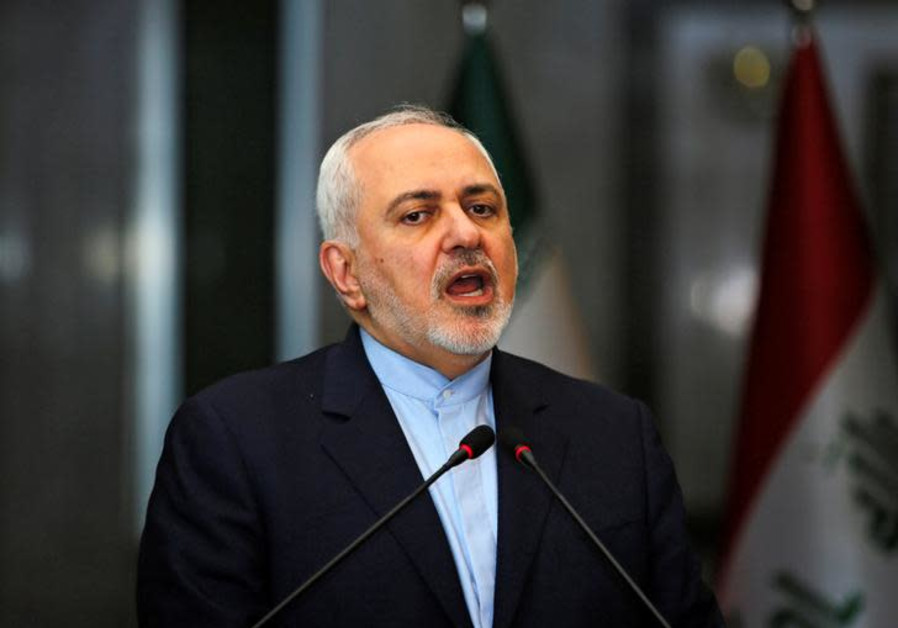Mystery surrounds Mohammad Javad Zarif’s ‘resignation’

Iranian Foreign Minister Mohammad Javad Zarif. (photo credit: REUTERS/KHALID AL MOUSILY)
A day after Mohammad Javad Zarif announced his resignation on Instagram, the foreign minister of Iran is receiving support from members of parliament in Tehran amid calls for the president not to accept his decision.
The resignation of Iran’s most famous diplomat and the man often seen as the foreign face of Tehran, has plunged Iran’s highest levels of government and media into a momentary sense of bewilderment and lack of certainty. It illustrates not only the differences within the regime but also the ability of news organizations in Tehran to gather news with some levels of independence, more than in other totalitarian regimes. The Iranian Students News Agency, for instance, provides a discussion about various “sources” close to Zarif and President Hasssan Rouhani’s office.
According to the report there are other diplomats who will resign if Zarif indeed leaves the foreign ministry. Rouhani’s chief of staff, Mahmous Vaezi even denied that the resignation had taken place, initially. ISNA also reported that the Supreme Leader, Ayatollah Khamanei, had a say in Zarif retaining his post. It was not clear if that meant the leader might step in or if Khamenei wanted to push Zarif out. Meanwhile up to 150 members of parliament have reportedly signed a letter urging Rouhani to reject the resignation. There are 290 seats in parliament.
Fars News noted that Zarif was displeased by his absence from the meeting with Syrian President Bashar al-Assad on Monday. He had not been invited, apparently, or had not received adequate information about the high-level meeting. These were “subtle” and “delicate” matters, Iranian media reported, noting that Zarif and Rouhani had differences over foreign policy. There are rumor that Zarif opposed the increasing role of the Islamic Revolutionary Guard Corps in foreign policy and that he represented a more “moderate” agenda in Iran. But Zarif has also previously tweeted support for the IRGC, so it is not a simple story of hardliners and moderates, it is more complex.
Zarif had faced criticism and challenges in parliament dating back to the 2015 Iran deal discussions. He was frequently accused of a variety of misdeeds. A key antagonist was Javad Karim Ghoddousi, who was involved in a series of challenges to Zarif’s role. Zarif was critiqued for trusting the US, for travelling to France, for paying respects to Kurds, for mentioning corruption at home, and a litany of other issues. But is that what broke Zarif in the end?
Zarif wants the foreign ministry to have more power. His resignation also must be accepted by the President. However a Telegram channel linked to the IRGC celebrated his resignation, an indication that there are many voices who disliked Zarif. The mystery over Zarif’s fate will continue to plague Iran even as the regime seek to boast of its regional influence. This is a challenge for Tehran because for the last several years it has shown a united front to the Middle East and the world, seeking to portray the US as flip-flopping on policies. Zarif was a key in that narrative, accusing the US of isolating itself.
In an interview published on Fars News Zarif indicated that he believed it was important to combine diplomacy and action on the ground. “When we do that we had success.” This appeared to imply that Iran’s government should act as one, with the IRGC and other aspects of state power coordinating with the foreign ministry. “We must remove foreign policy from an issue of party or factional struggle. That is a fatal poison for foreign policy and it must not be the subject of partisan [politics]. There must be a trust in foreign policy workers at the national level, without it everything goes awry.” He may have been predicting and articulating the choice he was about to make in resigning. If so he has become a victim of the factional fighting and attempts to weaken the foreign ministry that he warned about. If not, it means that Zarif is making a ploy out of this resignation to either gain more power in government or parliament.
Join Jerusalem Post Premium Plus now for just $5 and upgrade your experience with an ads-free website and exclusive content. Click here>>






Comments are closed.